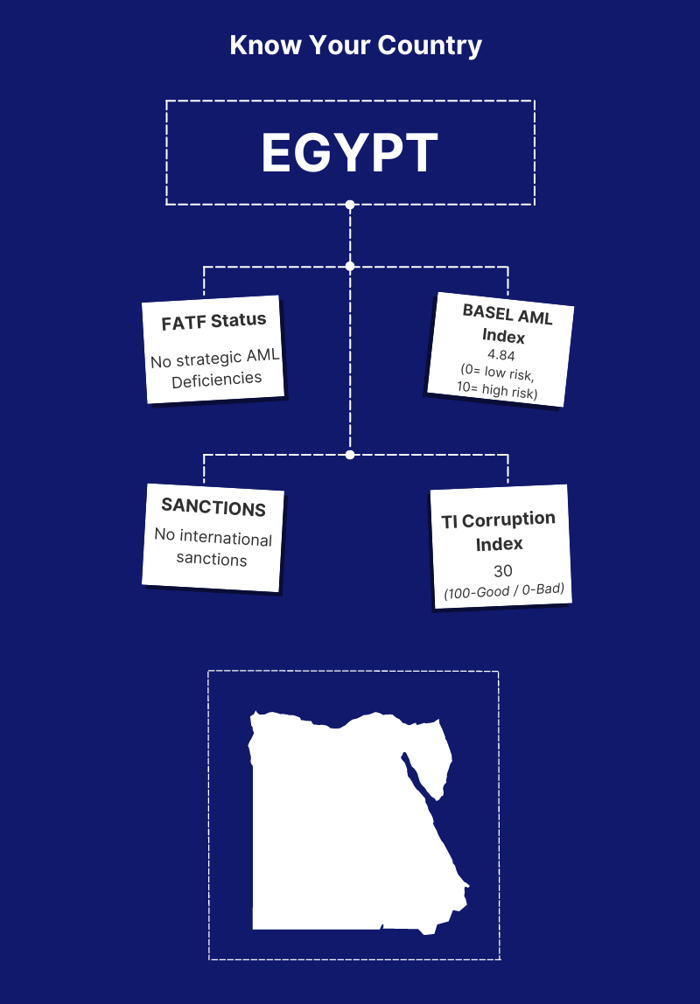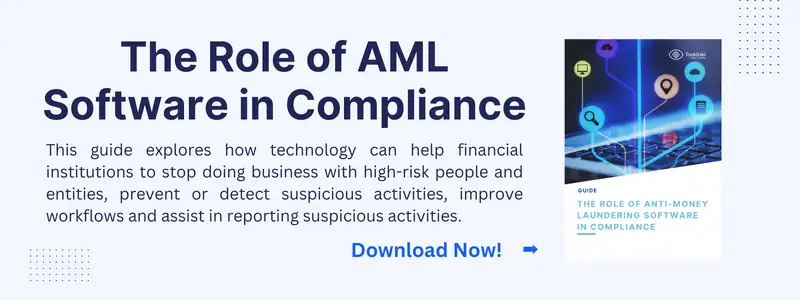Financial institutions play a vital role in the economic development of Egypt. With the increased pace of digital transformation in the financial industry, the risk of financial crimes such as money laundering, terrorist financing, and other illicit activities has also increased. The country has a robust regulatory framework in place to curb these financial crimes and protect the integrity of financial institutions.
Compliance with AML regulations is mandatory, and failure to do so can result in hefty fines, damage to the institution's reputation, and even criminal prosecution. Achieving AML compliance is a challenging task, especially for financial institutions in Egypt. The conventional methods of compliance are time-consuming, expensive, and prone to human errors. This blog post provides an overview of AML regulations in Egypt and how Tookitaki can help financial institutions comply with them.
AML Regulations in Egypt
Egypt has implemented a number of AML regulations in recent years to combat money laundering and terrorist financing. The Central Bank of Egypt (CBE), the primary regulatory authority responsible for implementing and enforcing AML regulations, issued regulations for Banks in 2003. The Law defined the AML obligations for financial institutions, mainly Egyptian banks, branches thereof, and branches of foreign banks operating in Egypt. The Money Laundering Combating Unit (MLCU) was established in 2002 under the CML Act, and its administrative regulations were issued in 2003 as Prime Ministerial Decree No. 951/2003.
Separately, the Financial Regulatory Authority of Egypt implemented "Anti Money Laundering and Terrorist Financing" Decree no. 2/2021 as a continuation to the Egyptian Anti-Money Laundering Law no. 80 of 2002, on January 19, 2021. Entities in non-banking financial services are subject to the requirements of this decree.
The regulations require financial institutions to establish and implement adequate policies, procedures, and controls to prevent money laundering and terrorist financing. The CBE also requires financial institutions to conduct customer due diligence (CDD) and ongoing monitoring of their customers' transactions to detect any suspicious activities.
Despite the implementation of these regulations, Egypt remains vulnerable to money laundering due to its large informal, cash-based economy. Approximately two-thirds of the population do not have bank accounts, and the informal economy accounts for around 40% of GDP. However, the government has shown increased willingness to tackle money laundering.
Non-compliance with AML regulations can result in significant penalties, including hefty fines, license revocation, and criminal prosecution. In Egypt, the maximum fine for AML violations can reach up to EGP 10 million (approximately USD 638,000).
AML Compliance Challenges for Financial Institutions in Egypt
Financial institutions in Egypt face various Anti-Money Laundering (AML) compliance challenges in their operations. These challenges are driven by increasing regulatory scrutiny and complexity. To comply with AML regulations, financial institutions in Egypt must implement measures such as customer due diligence, screening, risk-based approach, and transaction monitoring. They must establish risk-based policies, procedures, and controls to prevent money laundering and terrorist financing.
Another challenge is the limited resources of the financial institutions, which makes it difficult for them to comply with the regulations effectively. The increasing complexity of AML regulations, the surge in regulatory pressure, and the growing amount of data pose significant challenges for financial institutions in meeting AML compliance obligations.
Traditional approaches to AML compliance have limitations that make it difficult for financial institutions to detect and prevent money laundering activities. The manual processes involved in traditional approaches are time-consuming and labour-intensive. They require a significant amount of resources and are prone to errors. Moreover, traditional approaches lack the accuracy and efficiency required for effective AML compliance.
Financial institutions can seek the help of experts to advise them on strategic priorities and resourcing plans to address critical operational and compliance challenges. AML software solutions, like Tookitaki's, are engineered to work together, supercharged by advanced analytics and designed to deliver powerful unified enterprise case management capabilities. Financial institutions that invest in AML software solutions can better manage AML compliance challenges, meet their obligations, and protect themselves and their customers from financial crimes.
The Role of Technology in AML Compliance for Financial Institutions in Egypt
Technology has transformed the way financial institutions in Egypt achieve AML compliance. There are automated AML solutions that can analyse data and identify suspicious activities. These solutions are more accurate and efficient than traditional approaches, and they reduce the workload of compliance teams. This enables financial institutions to detect suspicious activities quickly and take appropriate action. Moreover, automated AML solutions can be customised to meet the specific needs of financial institutions, and they can adapt to changes in regulations.
The use of technology for AML compliance is essential for financial institutions in Egypt. Automated AML solutions can help financial institutions comply with the regulations efficiently and effectively and reduce the risk of penalties and reputational damage.
Tookitaki's AML Solutions for Financial Institutions in Egypt
Tookitaki is a pioneer in the fight against financial crime, leveraging a unique and innovative approach that transcends traditional solutions. The company's Anti-Money Laundering Suite (AMLS) and Anti-Financial Crime (AFC) Ecosystem work in tandem to address the limitations of siloed systems in combating money laundering.
The AFC Ecosystem is a community-based platform that facilitates the sharing of information and best practices in the battle against financial crime. Powering this ecosystem is a Typology Repository, a living database of money laundering techniques and schemes. This repository is enriched by the collective experiences and knowledge of financial institutions, regulatory bodies, and risk consultants worldwide, encompassing a broad range of typologies from traditional methods to emerging trends.
The AMLS is a software solution deployed at financial institutions. It is an end-to-end operating system that modernises compliance processes for banks and fintechs. The AMLS collaborates with the AFC Ecosystem through federated machine learning. This integration allows the AMLS to extract new typologies from the AFC Ecosystem, executing them at the clients' end to ensure that their AML programs remain cutting-edge.
The AMLS helps FIs to build a comprehensive risk-based anti-money laundering compliance program. It is an enterprise-wide solution built around three core modules: screening, risk scoring and transaction monitoring.
The AMLS platform has a modular design and consists of the following modules.
- Smart Screening
- Prospect Screening
- Name Screening
- Transaction Screening
- Dynamic Risk Scoring
- Prospect Risk Scoring
- Customer Risk Scoring
- Transaction Monitoring
- Case Manager
Benefits of Implementing Tookitaki's AML Solutions
Tookitaki's AML solutions offer several benefits for financial institutions in Egypt seeking to achieve efficient and effective AML compliance. These benefits include increased efficiency, reduced costs, and improved risk management.
Tookitaki's platform leverages artificial intelligence and machine learning technologies to provide a more efficient and effective way of achieving AML compliance. The platform is designed to automate several key AML processes. By automating these processes, financial institutions can reduce the time and resources required to achieve AML compliance.
In addition to increasing efficiency, Tookitaki's AML solutions can also help financial institutions in Egypt reduce costs associated with AML compliance. Traditional approaches to AML compliance often involve manual processes and extensive manpower, which can be costly. With Tookitaki's platform, financial institutions can automate several key AML processes, reducing the need for manual intervention and potentially lowering costs associated with AML compliance.
Finally, implementing Tookitaki's AML solutions can help financial institutions in Egypt improve their risk management capabilities. The platform is designed to identify and flag potential AML risks, enabling financial institutions to take proactive measures to prevent money laundering and other financial crimes.
Achieve AML Compliance in Egypt with Tookitaki's Solutions
In conclusion, AML compliance is a critical aspect of financial institutions' operations in Egypt, and the consequences of non-compliance can be severe. While traditional approaches to AML compliance can be time-consuming and costly, the use of technology has made it easier and more efficient to achieve AML compliance.
Tookitaki's AML solutions offer financial institutions in Egypt a comprehensive and efficient way to achieve AML compliance. Tookitaki's solutions can quickly detect and flag suspicious transactions, reducing false positives and improving the accuracy of risk assessment. By implementing Tookitaki's AML solutions, financial institutions can not only achieve compliance with AML regulations in Egypt but also benefit from increased efficiency, reduced costs, and improved risk management.
We encourage financial institutions in Egypt to learn more about Tookitaki's AML solutions and book a demo to see how they can be implemented to achieve efficient and effective AML compliance. Contact us today to learn more.
Anti-Financial Crime Compliance with Tookitaki?






